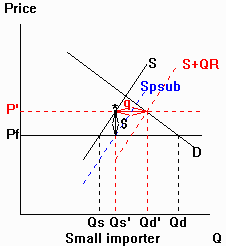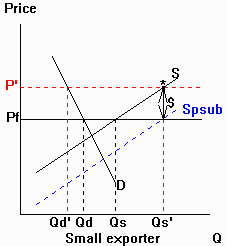

| Jim Whitney |
In each case below, suppose the government wants to raise domestic produciton
to Qs', which occurs at point * on the domestic supply curve. Regrardless
of the policy option, to produce Qs', domestic suppliers must receive P'
instead of Pf.
 |
 |
Small country importer:
| Policy option | Pb (buyers) | Qd | Ps (sellers) | Qs |
| Tariff: shift Pf up by the size of the tariff ($) | P' = Pf+$ | Qd', where D crosses P' | P' = Pf+$ | Qs', where S crosses P' |
| Quantitative restriction (QR): shift S right by the amount of the QR (q). The original S shows the domestic supply, and S+QR shows the total supplied, including licensed imports. | P', where S+QR crosses D | Qd', where D crosses P' | P' | Qs', where S crosses P' |
| Production subsidy (psub): shift S down by the size of the subsidy ($). The original S shows the true MC of each unit, but Spsub shows the lower amount sellers need to charge buyers, since the psub covers the rest. | Pf | Qd, where D crosses Pf | P' = Pf+$ | Qs', where Spsub crosses Pf (same Q as where S crosses P') |
Small country exporter:
| Policy option | Pb (buyers) | Qd | Ps (sellers) | Qs |
| Export subsidy: shift Pf up by the size of the export subsidy ($) | P' = Pf+$ | Qd', where D crosses P' | P' = Pf+$ | Qs', where S crosses P' |
| Production subsidy (psub): shift S down by the size of the subsidy ($). The original S shows the true MC of each unit, but Spsub shows the lower amount sellers need to charge buyers, since the psub covers the rest. | Pf | Qd, where D crosses Pf | P' = Pf+$ | Qs', where Spsub crosses Pf (same Q as where S crosses P') |